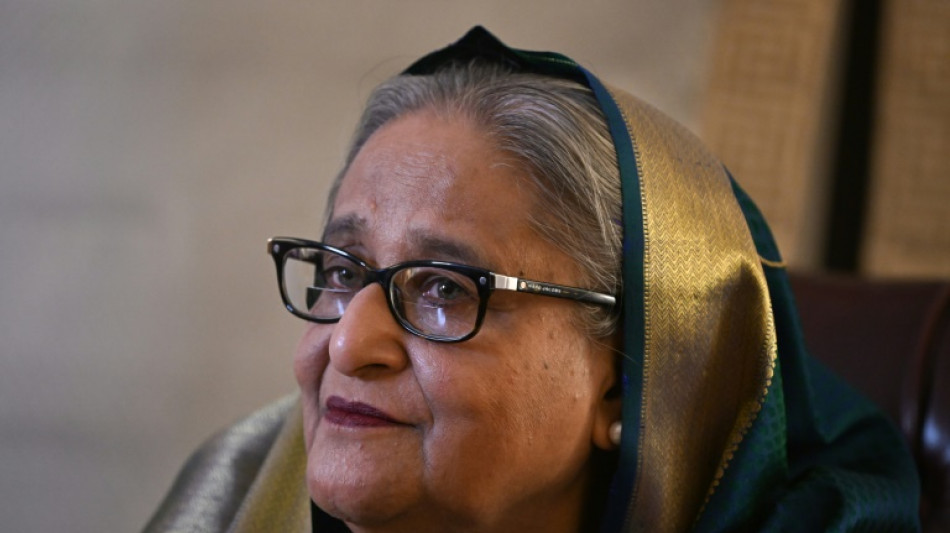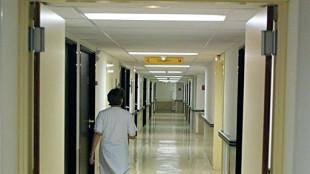
-
 Palestinians welcome ICC arrest warrants for Israeli officials
Palestinians welcome ICC arrest warrants for Israeli officials
-
Senegal ruling party wins parliamentary majority: provisional results

-
 Fiji's Loganimasi in for banned Radradra against Ireland
Fiji's Loganimasi in for banned Radradra against Ireland
-
New proposal awaited in Baku on climate finance deal

-
 Brazil police urge Bolsonaro's indictment for 2022 'coup' plot
Brazil police urge Bolsonaro's indictment for 2022 'coup' plot
-
NFL issues security alert to teams about home burglaries

-
 Common water disinfectant creates potentially toxic byproduct: study
Common water disinfectant creates potentially toxic byproduct: study
-
Chimps are upping their tool game, says study

-
 US actor Smollett's conviction for staged attack overturned
US actor Smollett's conviction for staged attack overturned
-
Fears rise of gender setbacks in global climate battle

-
 'World's best coach' Gatland 'won't leave Wales' - Howley
'World's best coach' Gatland 'won't leave Wales' - Howley
-
Indian PM Modi highlights interest in Guyana's oil

-
 Israel strikes kill 22 in Lebanon as Hezbollah targets south Israel
Israel strikes kill 22 in Lebanon as Hezbollah targets south Israel
-
Argentina lead Davis Cup holders Italy

-
 West Bank city buries three Palestinians killed in Israeli raids
West Bank city buries three Palestinians killed in Israeli raids
-
Fairuz, musical icon of war-torn Lebanon, turns 90

-
 Jones says Scotland need to beat Australia 'to be taken seriously'
Jones says Scotland need to beat Australia 'to be taken seriously'
-
Stock markets push higher but Ukraine tensions urge caution

-
 IMF sees 'limited' impact of floods on Spain GDP growth
IMF sees 'limited' impact of floods on Spain GDP growth
-
Fresh Iran censure looms large over UN nuclear meeting

-
 Volkswagen workers head towards strikes from December
Volkswagen workers head towards strikes from December
-
'More cautious' Dupont covers up in heavy Parisian snow before Argentina Test

-
 UK sanctions Angola's Isabel dos Santos in graft crackdown
UK sanctions Angola's Isabel dos Santos in graft crackdown
-
Sales of existing US homes rise in October

-
 Crunch time: What still needs to be hammered out at COP29?
Crunch time: What still needs to be hammered out at COP29?
-
Minister among 12 held over Serbia station collapse

-
 Spurs boss Postecoglou hails 'outstanding' Bentancur despite Son slur
Spurs boss Postecoglou hails 'outstanding' Bentancur despite Son slur
-
South Sudan rejects 'malicious' report on Kiir family businesses

-
 Kyiv claims 'crazy' Russia fired nuke-capable missile
Kyiv claims 'crazy' Russia fired nuke-capable missile
-
Australia defeat USA to reach Davis Cup semis

-
 Spain holds 1st talks with Palestinian govt since recognising state
Spain holds 1st talks with Palestinian govt since recognising state

Bangladesh PM denounces 'tragedy' of rich nations on climate
A country of fertile, densely populated deltas, low-lying Bangladesh is among the most vulnerable nations in the world to climate change.
But the urgency of the situation is not being matched by actions of countries responsible for emissions, Prime Minister Sheikh Hasina said.
"They don't act. They can talk but they don't act," she told AFP on a visit to New York for the United Nations General Assembly.
"The rich countries, the developed countries, this is their responsibility. They should come forward. But we are not getting that much response from them. That is the tragedy," she said.
"I know the rich countries, they want to become more rich and rich. They don't bother for others."
Bangladesh has produced a miniscule amount of the greenhouse gas emissions that have already contributed to the warming of the planet by an average of nearly 1.2 degrees Celsius above pre-industrial levels.
The Paris accord called for $100 billion a year by 2020 from wealthy nations to help developing nations cope with climate change. That year, $83.3 billion was committed, including through private sources, according to Organization for Economic Co-operation and Development figures.
One key issue facing the next UN climate summit, to take place in Egypt in November, is whether wealthy nations also need to pay for losses and damages from climate change -- not just to pay for adaptation and mitigation.
"We want that fund to be raised. Unfortunately we didn't get a good response from the developed countries," Hasina said.
"Because they are the responsible ones for these damages, they should come forward," the 74-year-old added.
Wealthy nations have agreed only to discuss the loss and damage issue through 2024.
This year's General Assembly featured repeated calls for climate justice. The leader of tiny Vanuatu urged an international treaty against fossil fuels while the prime minister of Pakistan warned that floods that have swamped one-third of his country could happen elsewhere.
- Questions on Rohingya -
Climate is not the only issue on which Bangladesh sees inaction from the West.
Some 750,000 Rohingya fled to Bangladesh in 2017 after a scorched-earth campaign against the minority group by troops in neighboring Myanmar, a campaign that the United States has described as genocide.
While the world has saluted Bangladesh for taking in the refugees -- along with 100,000 who fled earlier violence -- attention has shifted since the Covid-19 pandemic and now Russia's invasion of Ukraine.
"As long as they are in our country, we feel that it is our duty," she said. But for Bangladeshi hosts, patience is running thin, she said.
Michelle Bachelet, then the UN human rights chief, said on a visit in August that there was growing anti-Rohingya sentiment in Bangladesh.
"Local people also suffer a lot," Hasina said. "I can't say that they're angry, but they feel uncomfortable."
"All the burden is coming upon us. This is a problem."
The Rohingya refugees, who are mostly Muslim, live largely in ramshackle camps with tarpaulins, sheet metal and bamboo.
Bachelet on her visit said there was no prospect of sending them back to Buddhist-majority, military-run Myanmar, where the Rohingya are not considered citizens.
But in her interview, Hasina signaled that there were few options other than for the Rohingya to reside in camps.
"It is not possible for us to give them an open space because they have their own country. They want to go back there. So that is the main priority for everybody," Hasina said.
"If anybody wants to take them, they can take them," she added. "Why should I object?"
J.Fankhauser--BTB



